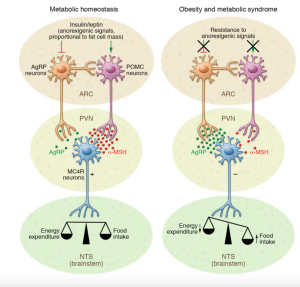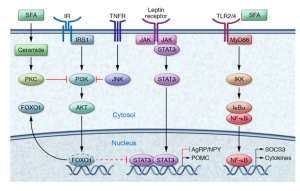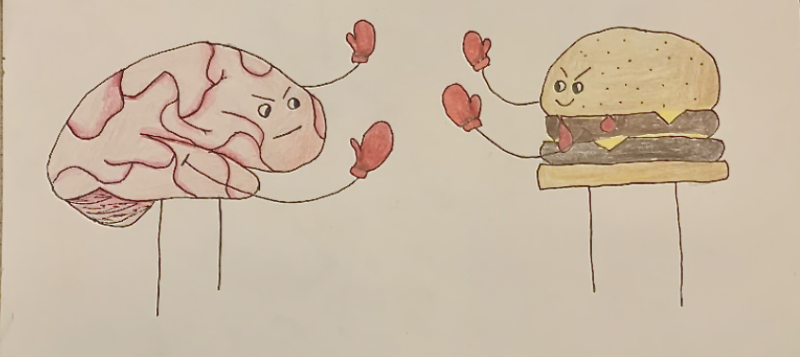Artstract by Jessica Howard
Obesity can have multiple harmful effects on a person’s life. Most of us know mostly about the physical effects such as increased risk for heart disease. But there are also harmful effects to the brain, specifically the hypothalamus. The hypothalamus is the part of the brain in charge of homeostasis of the body using hormones. This includes, temperature regulation, energy expenditure, and eating habits. One important hormone that the hypothalamus uses to balance energy expenditure with calorie intake is insulin (Sateil & Olefsky, 2017).
How Energy is normally regulated
Normally, in the hypothalamus there are chemicals in the brain that control food intake and energy expenditure. The agouti-related peptide (AgRP) is inhibited by insulin while proopiomelanocortin (POMC) is activated by insulin. This causes the body to decrease its food intake while increasing its energy expenditure. AgRP expressing neurons normally activate melanocortin receptor expressing neurons (MC4R) which leads to increased food intake and decreased energy expenditure. POMC expressing neurons act as inhibitors of MC4R neurons which decreases food intake and increases energy expenditure. Insulin is an important part of keeping these two systems balanced for energy homeostasis (Sateil & Olefsky, 2017).

Salteil, A. R., & Olefsky, J. M. (2017). Hypothalamic inflammation in obesity and metabolic disease. The Journal of Clinical Investigation 127(1), 24-32. Doi:10.1172/JCI88878.
What Goes Wrong?
Obesity caused by a high fat diet activates stress signals in the hypothalamic neurons which release things called cytokines and other inflammatory responses. These responses lead to a decrease in sensitivity of the AgRP and POMC expressing neurons, this is also known as insulin resistance. This means that the neurons no longer respond as strongly to the presence of insulin. So AgRP neurons aren’t getting inhibited and POMC neurons aren’t getting activated, this means that there will be an increase in energy intake and a decrease in energy expenditure (Sateil & Olefsky, 2017).
One way which insulin is inhibited is by the activation of the MAPK pathway. This triggers the activation of JNK signaling which is a mediator of insulin receptor substrate proteins, which help transmit signals from insulin to create a cellular response (Shaw, 2011). In other words the JNK signaling inhibits insulin receptor substrate proteins by phosphorylating them, which deactivates them. This leads to insulin resistance in that cell. When this happens in AgRP neurons they are no longer inhibited and food intake increase, which then leads to more weight gain that serves to continue the insulin problem (Sateil & Olefsky, 2017).

Salteil, A. R., & Olefsky, J. M. (2017). Hypothalamic inflammation in obesity and metabolic disease. The Journal of Clinical Investigation 127(1), 24-32. Doi:10.1172/JCI88878.
What Can Be Done?
Obesity is a very serious condition that can cause great harm to all organs in the body, not just the brain. That is why it is important to seek treatment sooner rather than later. It is best to start with your doctor and get recommendations for a dietitian. A dietitian can help you create a meal plan that is balanced and healthy. It is also important to get regular exercise that with increase your heart rate, like swimming or fast walking. It can also be helpful to join a local weight loss group. This will offer you both a method of accountability and support from others facing similar challenges. It is also important to seek support from your family and friends. Tell them what you are trying to accomplish so that they can also help keep you accountable and keep you from any tempting situations. By sticking with your plan it is possible to lose weight and get better to live a longer healthier life (NHS inform, 2023).
References
NHS inform. (2023). Obesity causes and treatments. causes & treatments – Illnesses & conditions . Retrieved April 15, 2023, from https://www.nhsinform.scot/illnesses-and-conditions/nutritional/obesity#:~:text=The%20best%20way%20to%20treat,a%20local%20weight%20loss%20group
Salteil, A. R., & Olefsky, J. M. (2017). Hypothalamic inflammation in obesity and metabolic disease. The Journal of Clinical Investigation 127(1), 24-32. Doi:10.1172/JCI88878.
Shaw, L. M. (2011, June 1). The insulin receptor substrate (IRS) proteins: At the intersection of metabolism and cancer. Cell cycle (Georgetown, Tex.). Retrieved April 15, 2023, from https://www.ncbi.nlm.nih.gov/pmc/articles/PMC3142458/#:~:text=The%20IRS%20proteins%20are%20a,in%20response%20to%20insulin%20stimulation.
